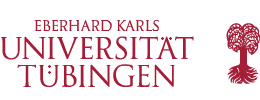Shakespeare und Co.
(12 Einträge)
Vorlesung Shakespeare and Co, 1. und 2. Stunde
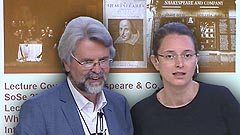

| Title: | Vorlesung Shakespeare and Co, 1. und 2. Stunde |
| Description: | Vorlesung im SoSe 2020; Dienstag, 21. April 2020 |
| Creator: | Matthias Bauer (author), Angelika Zirker (author) |
| Contributor: | ZDV Universität Tübingen (producer) |
| Publisher: | ZDV Universität Tübingen |
| Date Created: | 2020-04-21 |
| Subjects: | Englisches Seminar, Shakespeare, Shakespeare and Co, Lecture, Vorlesung, Genius, Mystery, Collaboration, Poetry, Theatre, |
| Identifier: | UT_20200421_001_shakesco_0001 |
| Rights: | Rechtshinweise |
| Abstracts: | The image of Shakespeare as a solitary genius has been radically revised in recent decades. In particular, it has been established that a substantial part of his works was written together with other authors. They were the products of a culture of collaboration. In this lecture course, we not only want to learn more about Shakespeare as a co-author in the literal sense but also explore other forms of co-creativity relevant to Shakespeares works. For example, he could envisage dead writers, as well as his readers, as co-authors of his poems and plays. And whenever he (and his co-authors) represent forms of community, they relate them to literary productivity. Focusing on these topics, we will study a range of works by Shakespeare and others. Students at all levels will thus be introduced to Early Modern English literature, and drama in particular. We will discuss Shakespeares Sonnets as well as his plays Romeo and Juliet, Julius Caesar, and Much Ado About Nothing; Norton and Sackvilles Gorboduc (a source for King Lear), Shakespeare and Fletchers The Two Noble Kinsmen, Chapman, Jonson and Marstons: Eastward Ho! Beaumont and Fletchers The Night of the Burning Pestle, Websters The Duchess of Malfi, and Marlowes Doctor Faustus (a play that was collaboratively extended over time). |
Vorlesung Shakespeare and Co, 3. und 4. Stunde
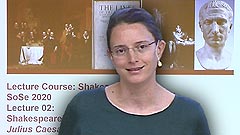

| Title: | Vorlesung Shakespeare and Co, 3. und 4. Stunde |
| Description: | Vorlesung im SoSe 2020; Dienstag, 28. April 2020 |
| Creator: | Matthias Bauer (author), Angelika Zirker (author) |
| Contributor: | ZDV Universität Tübingen (producer) |
| Publisher: | ZDV Universität Tübingen |
| Date Created: | 2020-04-28 |
| Subjects: | Englisches Seminar, Shakespeare, Shakespeare and Co, Lecture, Vorlesung, Shakespeare's Company with the Past, Julius Caesar, Sources, Early Modern Period, Plutarch, Parallel Lives, Thomas North, |
| Identifier: | UT_20200428_001_shakesco_0001 |
| Rights: | Rechtshinweise |
| Abstracts: | The image of Shakespeare as a solitary genius has been radically revised in recent decades. In particular, it has been established that a substantial part of his works was written together with other authors. They were the products of a culture of collaboration. In this lecture course, we not only want to learn more about Shakespeare as a co-author in the literal sense but also explore other forms of co-creativity relevant to Shakespeares works. For example, he could envisage dead writers, as well as his readers, as co-authors of his poems and plays. And whenever he (and his co-authors) represent forms of community, they relate them to literary productivity. Focusing on these topics, we will study a range of works by Shakespeare and others. Students at all levels will thus be introduced to Early Modern English literature, and drama in particular. We will discuss Shakespeares Sonnets as well as his plays Romeo and Juliet, Julius Caesar, and Much Ado About Nothing; Norton and Sackvilles Gorboduc (a source for King Lear), Shakespeare and Fletchers The Two Noble Kinsmen, Chapman, Jonson and Marstons: Eastward Ho! Beaumont and Fletchers The Night of the Burning Pestle, Websters The Duchess of Malfi, and Marlowes Doctor Faustus (a play that was collaboratively extended over time). |
Vorlesung Shakespeare and Co, 5. und 6. Stunde
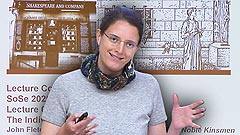

| Title: | Vorlesung Shakespeare and Co, 5. und 6. Stunde |
| Description: | Vorlesung im SoSe 2020; Dienstag, 05. Mai 2020 |
| Creator: | Matthias Bauer (author), Angelika Zirker (author) |
| Contributor: | ZDV Universität Tübingen (producer) |
| Publisher: | ZDV Universität Tübingen |
| Date Created: | 2020-05-05 |
| Subjects: | Englisches Seminar, Shakespeare, Shakespeare and Co, Lecture, Vorlesung, Individual in Company, John Fletcher, William Shakespeare, The Two Noble Kinsmen, Individual, Relations, Relationships, Models of Friendship, dividual, |
| Identifier: | UT_20200505_001_shakesco_0001 |
| Rights: | Rechtshinweise |
| Abstracts: | The image of Shakespeare as a solitary genius has been radically revised in recent decades. In particular, it has been established that a substantial part of his works was written together with other authors. They were the products of a culture of collaboration. In this lecture course, we not only want to learn more about Shakespeare as a co-author in the literal sense but also explore other forms of co-creativity relevant to Shakespeares works. For example, he could envisage dead writers, as well as his readers, as co-authors of his poems and plays. And whenever he (and his co-authors) represent forms of community, they relate them to literary productivity. Focusing on these topics, we will study a range of works by Shakespeare and others. Students at all levels will thus be introduced to Early Modern English literature, and drama in particular. We will discuss Shakespeares Sonnets as well as his plays Romeo and Juliet, Julius Caesar, and Much Ado About Nothing; Norton and Sackvilles Gorboduc (a source for King Lear), Shakespeare and Fletchers The Two Noble Kinsmen, Chapman, Jonson and Marstons: Eastward Ho! Beaumont and Fletchers The Night of the Burning Pestle, Websters The Duchess of Malfi, and Marlowes Doctor Faustus (a play that was collaboratively extended over time). |
Vorlesung Shakespeare and Co, 7. und 8. Stunde
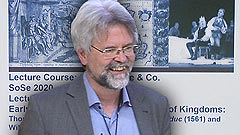

| Title: | Vorlesung Shakespeare and Co, 7. und 8. Stunde |
| Description: | Vorlesung im SoSe 2020; Dienstag, 12. Mai 2020 |
| Creator: | Matthias Bauer (author), Angelika Zirker (author) |
| Contributor: | ZDV Universität Tübingen (producer) |
| Publisher: | ZDV Universität Tübingen |
| Date Created: | 2020-05-12 |
| Subjects: | Englisches Seminar, Shakespeare, Shakespeare and Co, Lecture, Vorlesung, Early Co-Authorship, Division of Kingdoms, Thomas Norton, Thomas Sackville, Gorboduc, William Shakespeare, King Lear, Common Ancestry, Didactic Tragedy, Authority, Co-operation, Divisions, Bonds, Being Individual, |
| Identifier: | UT_20200512_001_shakesco_0001 |
| Rights: | Rechtshinweise |
| Abstracts: | The image of Shakespeare as a solitary genius has been radically revised in recent decades. In particular, it has been established that a substantial part of his works was written together with other authors. They were the products of a culture of collaboration. In this lecture course, we not only want to learn more about Shakespeare as a co-author in the literal sense but also explore other forms of co-creativity relevant to Shakespeares works. For example, he could envisage dead writers, as well as his readers, as co-authors of his poems and plays. And whenever he (and his co-authors) represent forms of community, they relate them to literary productivity. Focusing on these topics, we will study a range of works by Shakespeare and others. Students at all levels will thus be introduced to Early Modern English literature, and drama in particular. We will discuss Shakespeares Sonnets as well as his plays Romeo and Juliet, Julius Caesar, and Much Ado About Nothing; Norton and Sackvilles Gorboduc (a source for King Lear), Shakespeare and Fletchers The Two Noble Kinsmen, Chapman, Jonson and Marstons: Eastward Ho! Beaumont and Fletchers The Night of the Burning Pestle, Websters The Duchess of Malfi, and Marlowes Doctor Faustus (a play that was collaboratively extended over time). |
Vorlesung Shakespeare and Co, 9. und 10. Stunde
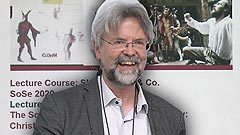

| Title: | Vorlesung Shakespeare and Co, 9. und 10. Stunde |
| Description: | Vorlesung im SoSe 2020; Dienstag, 19. Mai 2020 |
| Creator: | Matthias Bauer (author), Angelika Zirker (author) |
| Contributor: | ZDV Universität Tübingen (producer) |
| Publisher: | ZDV Universität Tübingen |
| Date Created: | 2020-05-19 |
| Subjects: | Englisches Seminar, Shakespeare, Shakespeare and Co, Lecture, Vorlesung, Solitary Hero, Communal Play, Christopher Marlowe, Doctor Faustus, Individual, Popular (Stage) Hero, Ambiguities, |
| Identifier: | UT_20200519_001_shakesco_0001 |
| Rights: | Rechtshinweise |
| Abstracts: | The image of Shakespeare as a solitary genius has been radically revised in recent decades. In particular, it has been established that a substantial part of his works was written together with other authors. They were the products of a culture of collaboration. In this lecture course, we not only want to learn more about Shakespeare as a co-author in the literal sense but also explore other forms of co-creativity relevant to Shakespeares works. For example, he could envisage dead writers, as well as his readers, as co-authors of his poems and plays. And whenever he (and his co-authors) represent forms of community, they relate them to literary productivity. Focusing on these topics, we will study a range of works by Shakespeare and others. Students at all levels will thus be introduced to Early Modern English literature, and drama in particular. We will discuss Shakespeares Sonnets as well as his plays Romeo and Juliet, Julius Caesar, and Much Ado About Nothing; Norton and Sackvilles Gorboduc (a source for King Lear), Shakespeare and Fletchers The Two Noble Kinsmen, Chapman, Jonson and Marstons: Eastward Ho! Beaumont and Fletchers The Night of the Burning Pestle, Websters The Duchess of Malfi, and Marlowes Doctor Faustus (a play that was collaboratively extended over time). |
Vorlesung Shakespeare and Co, 11. und 12. Stunde
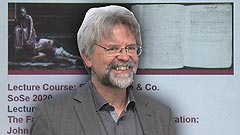

| Title: | Vorlesung Shakespeare and Co, 11. und 12. Stunde |
| Description: | Vorlesung im SoSe 2020; Dienstag, 26. Mai 2020 |
| Creator: | Matthias Bauer (author), Angelika Zirker (author) |
| Contributor: | ZDV Universität Tübingen (producer) |
| Publisher: | ZDV Universität Tübingen |
| Date Created: | 2020-05-26 |
| Subjects: | Englisches Seminar, Shakespeare, Shakespeare and Co, Lecture, Vorlesung, Failure of Community, Collaboration, John Webster, The Duchess of Malfi, Tragedy, Love Tragedy, Revenge Tragedy, Metatheatre, Illusion, Book, Function of Commonplaces, |
| Identifier: | UT_20200526_001_shakesco_0001 |
| Rights: | Rechtshinweise |
| Abstracts: | The image of Shakespeare as a solitary genius has been radically revised in recent decades. In particular, it has been established that a substantial part of his works was written together with other authors. They were the products of a culture of collaboration. In this lecture course, we not only want to learn more about Shakespeare as a co-author in the literal sense but also explore other forms of co-creativity relevant to Shakespeares works. For example, he could envisage dead writers, as well as his readers, as co-authors of his poems and plays. And whenever he (and his co-authors) represent forms of community, they relate them to literary productivity. Focusing on these topics, we will study a range of works by Shakespeare and others. Students at all levels will thus be introduced to Early Modern English literature, and drama in particular. We will discuss Shakespeares Sonnets as well as his plays Romeo and Juliet, Julius Caesar, and Much Ado About Nothing; Norton and Sackvilles Gorboduc (a source for King Lear), Shakespeare and Fletchers The Two Noble Kinsmen, Chapman, Jonson and Marstons: Eastward Ho! Beaumont and Fletchers The Night of the Burning Pestle, Websters The Duchess of Malfi, and Marlowes Doctor Faustus (a play that was collaboratively extended over time). |
Vorlesung Shakespeare and Co, 13. und 14. Stunde
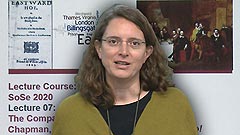

| Title: | Vorlesung Shakespeare and Co, 13. und 14. Stunde |
| Description: | Vorlesung im SoSe 2020; Dienstag, 09. Juni 2020 |
| Creator: | Matthias Bauer (author), Angelika Zirker (author) |
| Contributor: | ZDV Universität Tübingen (producer) |
| Publisher: | ZDV Universität Tübingen |
| Date Created: | 2020-06-09 |
| Subjects: | Englisches Seminar, Shakespeare, Shakespeare and Co, Lecture, Vorlesung, Company of Authors, Chapman, Jonson, Marston, Eastward Ho!, Prologue, Character, Communication, Commonplaces, Proverbs, Parody, |
| Identifier: | UT_20200609_001_shakesco_0001 |
| Rights: | Rechtshinweise |
| Abstracts: | The image of Shakespeare as a solitary genius has been radically revised in recent decades. In particular, it has been established that a substantial part of his works was written together with other authors. They were the products of a culture of collaboration. In this lecture course, we not only want to learn more about Shakespeare as a co-author in the literal sense but also explore other forms of co-creativity relevant to Shakespeares works. For example, he could envisage dead writers, as well as his readers, as co-authors of his poems and plays. And whenever he (and his co-authors) represent forms of community, they relate them to literary productivity. Focusing on these topics, we will study a range of works by Shakespeare and others. Students at all levels will thus be introduced to Early Modern English literature, and drama in particular. We will discuss Shakespeares Sonnets as well as his plays Romeo and Juliet, Julius Caesar, and Much Ado About Nothing; Norton and Sackvilles Gorboduc (a source for King Lear), Shakespeare and Fletchers The Two Noble Kinsmen, Chapman, Jonson and Marstons: Eastward Ho! Beaumont and Fletchers The Night of the Burning Pestle, Websters The Duchess of Malfi, and Marlowes Doctor Faustus (a play that was collaboratively extended over time). |
Vorlesung Shakespeare and Co, 15. und 16. Stunde
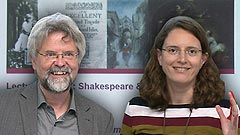

| Title: | Vorlesung Shakespeare and Co, 15. und 16. Stunde |
| Description: | Vorlesung im SoSe 2020; Dienstag, 16. Juni 2020 |
| Creator: | Matthias Bauer (author), Angelika Zirker (author) |
| Contributor: | ZDV Universität Tübingen (producer) |
| Publisher: | ZDV Universität Tübingen |
| Date Created: | 2020-06-16 |
| Subjects: | Englisches Seminar, Shakespeare, Shakespeare and Co, Lecture, Vorlesung, Creative Together, William Shakespeare, Romeo and Juliet, Emulation, Collaboration, Battles, Conflicts, Strife, The Encounter Sonnet, The Leave-taking, |
| Identifier: | UT_20200616_001_shakesco_0001 |
| Rights: | Rechtshinweise |
| Abstracts: | The image of Shakespeare as a solitary genius has been radically revised in recent decades. In particular, it has been established that a substantial part of his works was written together with other authors. They were the products of a culture of collaboration. In this lecture course, we not only want to learn more about Shakespeare as a co-author in the literal sense but also explore other forms of co-creativity relevant to Shakespeares works. For example, he could envisage dead writers, as well as his readers, as co-authors of his poems and plays. And whenever he (and his co-authors) represent forms of community, they relate them to literary productivity. Focusing on these topics, we will study a range of works by Shakespeare and others. Students at all levels will thus be introduced to Early Modern English literature, and drama in particular. We will discuss Shakespeares Sonnets as well as his plays Romeo and Juliet, Julius Caesar, and Much Ado About Nothing; Norton and Sackvilles Gorboduc (a source for King Lear), Shakespeare and Fletchers The Two Noble Kinsmen, Chapman, Jonson and Marstons: Eastward Ho! Beaumont and Fletchers The Night of the Burning Pestle, Websters The Duchess of Malfi, and Marlowes Doctor Faustus (a play that was collaboratively extended over time). |
Vorlesung Shakespeare and Co, 17. und 18. Stunde
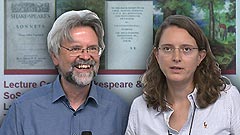

| Title: | Vorlesung Shakespeare and Co, 17. und 18. Stunde |
| Description: | Vorlesung im SoSe 2020; Dienstag, 23. Juni 2020 |
| Creator: | Matthias Bauer (author), Angelika Zirker (author) |
| Contributor: | ZDV Universität Tübingen (producer) |
| Publisher: | ZDV Universität Tübingen |
| Date Created: | 2020-06-23 |
| Subjects: | Englisches Seminar, Shakespeare, Shakespeare and Co, Lecture, Vorlesung, Shakespeare's Sonnets, Reader, Author, Addressee, World, Poem, Sonnet 1, Sonnet 2, (Re)Creator, Sonnet 18, Sonnet 81, |
| Identifier: | UT_20200623_001_shakesco_0001 |
| Rights: | Rechtshinweise |
| Abstracts: | The image of Shakespeare as a solitary genius has been radically revised in recent decades. In particular, it has been established that a substantial part of his works was written together with other authors. They were the products of a culture of collaboration. In this lecture course, we not only want to learn more about Shakespeare as a co-author in the literal sense but also explore other forms of co-creativity relevant to Shakespeares works. For example, he could envisage dead writers, as well as his readers, as co-authors of his poems and plays. And whenever he (and his co-authors) represent forms of community, they relate them to literary productivity. Focusing on these topics, we will study a range of works by Shakespeare and others. Students at all levels will thus be introduced to Early Modern English literature, and drama in particular. We will discuss Shakespeares Sonnets as well as his plays Romeo and Juliet, Julius Caesar, and Much Ado About Nothing; Norton and Sackvilles Gorboduc (a source for King Lear), Shakespeare and Fletchers The Two Noble Kinsmen, Chapman, Jonson and Marstons: Eastward Ho! Beaumont and Fletchers The Night of the Burning Pestle, Websters The Duchess of Malfi, and Marlowes Doctor Faustus (a play that was collaboratively extended over time). |
Vorlesung Shakespeare and Co, 19. und 20. Stunde
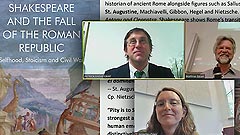

| Title: | Vorlesung Shakespeare and Co, 19. und 20. Stunde |
| Description: | Vorlesung im SoSe 2020; Dienstag, 30. Juni 2020 |
| Creator: | Matthias Bauer (author), Angelika Zirker (author), Patrick Gray (author) |
| Contributor: | ZDV Universität Tübingen (producer) |
| Publisher: | ZDV Universität Tübingen |
| Date Created: | 2020-06-30 |
| Subjects: | Englisches Seminar, Shakespeare, Shakespeare and Co, Lecture, Vorlesung, Senecan Virgil, Coriolanus, Aeneas, Virgil, Co-Creativity, Constancy, scopulus, |
| Identifier: | UT_20200630_001_shakesco_0001 |
| Rights: | Rechtshinweise |
| Abstracts: | The image of Shakespeare as a solitary genius has been radically revised in recent decades. In particular, it has been established that a substantial part of his works was written together with other authors. They were the products of a culture of collaboration. In this lecture course, we not only want to learn more about Shakespeare as a co-author in the literal sense but also explore other forms of co-creativity relevant to Shakespeares works. For example, he could envisage dead writers, as well as his readers, as co-authors of his poems and plays. And whenever he (and his co-authors) represent forms of community, they relate them to literary productivity. Focusing on these topics, we will study a range of works by Shakespeare and others. Students at all levels will thus be introduced to Early Modern English literature, and drama in particular. We will discuss Shakespeares Sonnets as well as his plays Romeo and Juliet, Julius Caesar, and Much Ado About Nothing; Norton and Sackvilles Gorboduc (a source for King Lear), Shakespeare and Fletchers The Two Noble Kinsmen, Chapman, Jonson and Marstons: Eastward Ho! Beaumont and Fletchers The Night of the Burning Pestle, Websters The Duchess of Malfi, and Marlowes Doctor Faustus (a play that was collaboratively extended over time). |
Vorlesung Shakespeare and Co, 21. und 22. Stunde
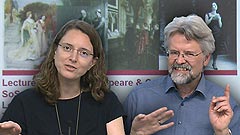

| Title: | Vorlesung Shakespeare and Co, 21. und 22. Stunde |
| Description: | Vorlesung im SoSe 2020; Dienstag, 07. Juli 2020 |
| Creator: | Matthias Bauer (author), Angelika Zirker (author) |
| Contributor: | ZDV Universität Tübingen (producer) |
| Publisher: | ZDV Universität Tübingen |
| Date Created: | 2020-07-07 |
| Subjects: | Englisches Seminar, Shakespeare, Shakespeare and Co, Lecture, Vorlesung, Company of Plots, Company of Genres, William Shakespeare, Much Ado About Nothing, Tragic Plots, Comic Plots, |
| Identifier: | UT_20200707_001_shakesco_0001 |
| Rights: | Rechtshinweise |
| Abstracts: | The image of Shakespeare as a solitary genius has been radically revised in recent decades. In particular, it has been established that a substantial part of his works was written together with other authors. They were the products of a culture of collaboration. In this lecture course, we not only want to learn more about Shakespeare as a co-author in the literal sense but also explore other forms of co-creativity relevant to Shakespeares works. For example, he could envisage dead writers, as well as his readers, as co-authors of his poems and plays. And whenever he (and his co-authors) represent forms of community, they relate them to literary productivity. Focusing on these topics, we will study a range of works by Shakespeare and others. Students at all levels will thus be introduced to Early Modern English literature, and drama in particular. We will discuss Shakespeares Sonnets as well as his plays Romeo and Juliet, Julius Caesar, and Much Ado About Nothing; Norton and Sackvilles Gorboduc (a source for King Lear), Shakespeare and Fletchers The Two Noble Kinsmen, Chapman, Jonson and Marstons: Eastward Ho! Beaumont and Fletchers The Night of the Burning Pestle, Websters The Duchess of Malfi, and Marlowes Doctor Faustus (a play that was collaboratively extended over time). |
Vorlesung Shakespeare and Co, 23. und 24. Stunde
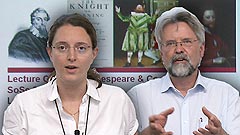

| Title: | Vorlesung Shakespeare and Co, 23. und 24. Stunde |
| Description: | Vorlesung im SoSe 2020; Dienstag, 14. Juli 2020 |
| Creator: | Matthias Bauer (author), Angelika Zirker (author) |
| Contributor: | ZDV Universität Tübingen (producer) |
| Publisher: | ZDV Universität Tübingen |
| Date Created: | 2020-07-14 |
| Subjects: | Englisches Seminar, Shakespeare, Shakespeare and Co, Lecture, Vorlesung, Co-Authorship, Fusion of Many Plays, Francis Beaumont, John Fletcher, The Knight of the Burning Pestle, |
| Identifier: | UT_20200714_001_shakesco_0001 |
| Rights: | Rechtshinweise |
| Abstracts: | The image of Shakespeare as a solitary genius has been radically revised in recent decades. In particular, it has been established that a substantial part of his works was written together with other authors. They were the products of a culture of collaboration. In this lecture course, we not only want to learn more about Shakespeare as a co-author in the literal sense but also explore other forms of co-creativity relevant to Shakespeares works. For example, he could envisage dead writers, as well as his readers, as co-authors of his poems and plays. And whenever he (and his co-authors) represent forms of community, they relate them to literary productivity. Focusing on these topics, we will study a range of works by Shakespeare and others. Students at all levels will thus be introduced to Early Modern English literature, and drama in particular. We will discuss Shakespeares Sonnets as well as his plays Romeo and Juliet, Julius Caesar, and Much Ado About Nothing; Norton and Sackvilles Gorboduc (a source for King Lear), Shakespeare and Fletchers The Two Noble Kinsmen, Chapman, Jonson and Marstons: Eastward Ho! Beaumont and Fletchers The Night of the Burning Pestle, Websters The Duchess of Malfi, and Marlowes Doctor Faustus (a play that was collaboratively extended over time). |
